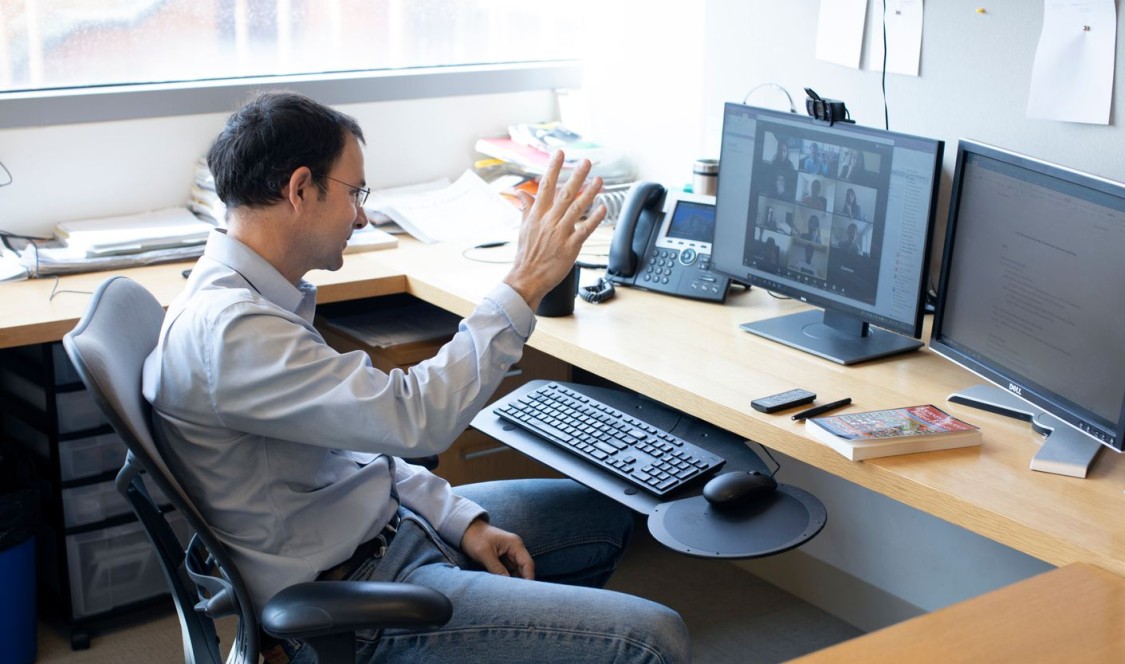Peter Uvin couldn’t contain his enthusiasm.
As teaching plans poured in from faculty members during the past two months, he saw the promise and power of a virtualized fall semester coming together. New, topical courses. Innovative pedagogies. Smart software tools. Special projects, guest speakers, and at-home labs. Nearly 20 pages and growing—a “magnum opus,” joked Uvin, vice president for academic affairs and dean of the faculty—whose rich details for adaptation to online-only engagement “are a testament to the faculty’s commitment to student learning this fall,” he said.
“This is exciting stuff. It is amazing what our faculty is doing to change and tailor their teaching to our current reality,” Uvin said.
An immersive, personalized, and advanced academic experience is just one component of the virtual-only fall semester plan, CMC Returns, announced by the College on July 24.
It has been a month of torturous uncertainty. CMC presented a robust campus reopening plan on July 1, with the hope that recent increases in COVID-19 infection, hospitalization, and death rates in Southern California would subside and lead to state or county public health approval.
Without that necessary, decisive authorization—and with parallel planning for a dynamic off-campus, virtual program at the ready—CMC will now move ahead with its best remaining option.
“After months of intensive study of these serious public health concerns, rigorous planning to overcome them, and hopeful anticipation of reconvening, we are disappointed that we cannot be together to take classes in Claremont this upcoming semester,” President Hiram E. Chodosh wrote in his letter to the community. “Yet, we see opportunity in this challenge. To reinforce our mission and commitment to each of you.”
Among the highlights of CMC’s fall virtual program: New, exciting courses steeped in current events, including The Coronavirus Recession in Historical Perspective: Business Cycle Theory and Policy with professor Manfred Keil; COVID19@CMC, which will document and archive the lived experience of the pandemic among the CMC community, with professor Tamara Venit-Shelton; and Racism Today and Human Rights Abuses, Historical Dimensions and Redress with professor Wendy Lower, in conjunction with the Mgrublian Center for Human Rights.
In preparation for the first day of classes on August 24, faculty are also working on curricular and pedagogical innovations that emphasize small groups, problem-based learning, one-on-one mentorship, expanded alumni engagement, and industry partnerships, among other individualized adjustments.
“In many ways, I consider this moment to be one in which I can finally implement long-held goals: recognizing that ‘teaching’ means inserting students into new worlds,” said associate professor Heather Ferguson, who will be reframing her History 55 course on the Middle East in the fall. “This requires active engagement rather than lectures; being aware of how this engagement often is best encouraged through small group tutorials and projects; participation focused more on platforms that allow students to post and respond to each other instead of working in isolation. In combination, these strategies also diversify the classroom by ensuring all voices are ‘present,’ so to speak.”
The Dean of Students office will also work to connect students with familiar campus resources and touchpoints, including a primary focus on mental health, said Sharon Basso, vice president for student affairs. The College has planned both a virtual Orientation and Club and Institute Fair. Through resident assistants, First-Year Guides, success consultants, and international student orientation leaders, CMCers will be affiliated with several small cohorts to provide varied and vibrant engagement experiences.
Student-led initiatives to foster socialization and familiarity with peers include ASCMC and CPB working with clubs and organizations to virtualize programming and create a calendar for coordination of all events. Technology won’t be the lone catalyst either, Basso said—with shipped gardening kits, fantasy leagues, baking/cooking nights, and mystery box exchanges among the planned activities for students.
“Department by department, we’ve walked through all the necessary questions. How will our academic success consultants do their work? How can we do Orientation? What do our clubs and organizations look like now? How will the CARE Center reach students through its important programming?” Basso said.
“Since mid-March, we’ve had to think about this reality for the fall. We are focused on making sure our students get the same facetime with faculty, staff, coaches, and experts that they were used to while on campus.”
Each aspect of the CMC Returns plan emerged from the engaged contributions of hundreds of students, faculty, staff, and parents, in collaboration with College leadership and the Board of Trustees. More details—on virtual Athenaeum programming, Soll Center for Student Opportunity initiatives, and CMS Athletics developments—are expected soon.
College leadership also will host a virtual forum with students on Monday morning, along with three more (families, faculty, and staff) on Tuesday to answer questions. That outreach must continue, Chodosh said, especially as CMC works through this semester and continues to position itself—hopefully—for a full campus reopening in the spring.
The good news is that the College’s advanced planning for multiple circumstances puts it in strong position to shift and change with COVID-19 developments. Whatever the direction, CMC is ready.
“The problems we face in the world today call on the full power of our liberal arts minds to contribute responsive, effective solutions,” Chodosh said. “In these ways, now more than ever, we draw on the core values that distinguish CMC, the singular strengths that propel us forward, the learning commitments that help us persevere when it is difficult to carry on.”
The full plan, along with necessary updates, can be viewed at the CMC Returns website. Community members can also ask questions or share ideas at [email protected].
—Thomas Rozwadowski

